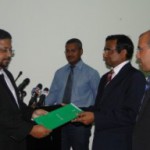A first amendment to the Protection of Religious Unity Act of 1994 bringing mosques under the Ministry of Islamic Affairs and outlawing independent prayer congregations was ratified by President Abdulla Yameen yesterday.
The amendments (Dhivehi) – passed with 33 votes in favour and 10 abstentions at the sitting of parliament on March 31 – brings all mosques and prayer houses in inhabited islands back under the purview of the Islamic Ministry.
Responsibility for the maintenance and management of mosques was transferred from the Islamic Ministry to local councils by the landmark Decentralisation Act of 2010.
In April 2012, Islamic Minister Dr Mohamed Shaheem Ali Saeed called for mosques to be returned to the ministry’s care following the refusal of some island councils to allow scholars to preach in mosques, most recently in the island of Innamaadhoo in Raa atoll.
The Innamadhoo island council filed a complaint with the Islamic Ministry last month against Sheikh Ibrahim Shameem Adam after the NGO Salaf preacher allegedly delivered a sermon in the island’s mosque without permission from the council.
Shameem was also prevented from delivering a sermon by the Omadhoo island council in December last year on the grounds that it might “disrupt the stability and social harmony of the island”.
In May 2013, Sheikh Imran Abdulla and Sheikh Ilyas Hussein – senior members of the religious conservative Adhaalath Party – were obstructed from preaching in Vaikaradhoo, in Haa Dhaalu atoll, whilst the Kamadhoo island council in Baa atoll prevented Sheikh Nasrulla Ali from preaching in the island’s mosque.
In Vaikaradhoo, the Adhaalath sheikhs were provided police protection in the face of unruly opposition protesters.
“Broadening the role of mosques” was among the eleven key policy objectives unveiled by the Islamic ministry in February.
Other provisions
The amendments ratified today also prohibit “sowing religious discord” in the community and outlaws independent or unauthorised prayer congregations.
Friday prayers must be conducted in mosques designated by the Islamic ministry while the Friday sermon must be delivered at a time determined by the ministry.
Religious sermons delivered at mosques must meanwhile adhere to rules set by the government.
In February this year, the Malé City Council shut down the Dharumavantha mosque at the request of the Islamic Ministry to stop unauthorised Friday prayers by a group described as “extremist” by Islamic Minister Shaheem.
Among other offences specified in the amendments were the construction of places of worship for other religions, the sale, possession, or advertisement of expressions or slogans of other religions and the importation, display, advertisement and sale of books of other religions.
Moreover, seeking financial assistance from foreigners to propagate other religions is prohibited while permission must be sought in writing from the Islamic Ministry before accepting a salary, funds, or a gift from a foreign party for conducting religious activities in the country.
Similar provisions were included in the religious unity regulations enforced in September 2011 to crack down on extremist and unlicensed preaching of Islam in the country.
The penalty for violations of either the law or the regulations is a jail sentence of between two to five years.
The new amendments also stipulate that permission must be sought in writing from the Islamic Ministry for preaching or delivering sermons, offering religious advice or publishing books concerning religion.
Other amendments brought to the religious unity law include a provision requiring Islam to be taught as a compulsory subject in all public and private schools from grade one to 12.
Additionally, the Education Ministry and other relevant state institutions must revise the Islamic curriculum to “instil love of religion among students” and discourage involvement in sectarian disputes.
Islam teachers will also be required to possess qualifications from Islamic universities or centres accepted by the Maldives Qualification Authority while expatriate teachers must belong to the Sunni sect.
In February, the government introduced Arabic language as an optional subject for grades one through 12.
The new amendments will come into force three months after ratification.
The amendment bill was submitted in June 2010 by the late Dr Afrasheem Ali, a moderate religious scholar and Progressive Party of Maldives MP who was was brutally murdered in October 2012.
The legislation was first put to a vote in October 2012 following review by parliament’s social affairs committee. The bill was however rejected and returned to committee after only 16 MPs out of 66 in attendance voted in favour.






Question is, does the quest for power by Minister Shaheem and his Adhaalath Party end up when all the mosques in the country are brought under their control, or people are not allowed to congregate and pray elsewhere other than mosques?
If this happened some years before; it would been quiet impossible to say what the state of affairs in the country would have been!!!!!
Pretty sure there would have been a lot of screamings and ravings!!!!!
I want to take this opportunity to laugh and rub salt in the wounds of the so-called 'religious' people who backed the koalhushun and considered Nasheed to be laadheenee. NOW do you know why Islam allows freedom of religion and thought?
You get your just punishments, you traitors! Now have some chili sauce!
Mosques as peaceful, yoga classes are OK. This is the best thing that can happen anywhere in the world.
Mosques as breeding places for hatred, are the worst thing that can happen. With a bit of donkey-carrot twist, some of the retarded actually believes that these yoga classes, primarily there to instill calm and control over their psyche, is the ticket to everlasting heaven, and as such, any steps that may stop this, is rebound back with fierce hatred! Arabian Camels want this to continue. Just as the gun-running nations want WARS to continue. They have unbridled interest these continue!
What a waste of time and human intellect! We can use our brain power to give something to the nation, to the people, the the future generations, instead of being selfish and concentrate on your own heaven trip!
@Wonderer their quest ends when they can knock down your doors, and knock up your 5 year old children, and get away with it under their 'divine law'.